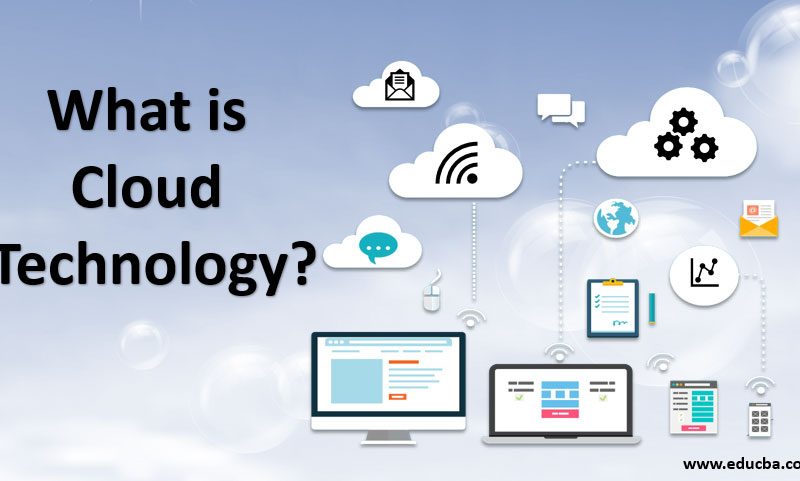Cloud technology is the delivery of various services via the Internet. Meanwhile, Tools and applications such as data storage, servers, databases, networking, and software are examples of these resources. We’ll dive into the Cloud-based technology, the solutions, and partners
Types of Cloud Technology
Cloud technology is not a solitary piece of technology, such as a microprocessor or a telephone. It is, instead, a system made up of three services below:
SaaS (software-as-a-service)
Refers to the licensing of a software application to clients. Licenses are often supplied on a pay-as-you-go or on-demand basis. This type of system is available in Microsoft Office 365. 1
Infrastructure-as-a-service (IaaS)
It is a means of delivering everything from operating systems to servers and storage as an on-demand service over IP-based connectivity. Furthermore, Customers can avoid purchasing software or servers by obtaining these resources through an outsourced, on-demand service. IBM Cloud and Microsoft Azure are two popular examples of IaaS systems. 2 and 3
Platform-as-a-service (PaaS)
This is the most complicated of the three layers of cloud computing. PaaS is comparable to SaaS in some ways, but the main difference is that rather than distributing software online. it is a platform for creating software that is supplied via the Internet. This strategy incorporates platforms such as Salesforce.com and Heroku.
Cloud Technology Solutions
Basically, cloud technology solutions enable your firm to leverage resources managed and stored in private, secure servers and networks by cloud service providers. Cloud solutions provide a simple way to backup and mobilize network resources and data.
Therefore, when deciding which cloud technology solutions are best for your company, consider hosted, hybrid, or on-premises solutions. Let’s take a closer look at these choices.
Cloud technology solutions: Hosted
A hosted cloud is a complete cloud deployment that includes all of the necessary apps and services. Apps are already available in a hosted cloud, and new applications can be developed on low- or high-level infrastructure. So, A management services provider manages, owns, and maintains hosted cloud solutions, which demand monthly subscription costs.
Cloud technology solutions: Hybrid
Hybrid cloud technology solutions combine on-premises infrastructure and hosted applications. However, If you have such an on-premises solution and want to gradually shift to the cloud, a hybrid cloud is a wonderful option. Hybrid solutions can assist you in growing your organization and transitioning to the cloud while connecting your internal systems. For example, you can use your on-premises infrastructure for sensitive or critical work while outsourcing less critical network resources to a cloud provider.
Cloud technology solutions: On-Premises
You’re probably thinking that on-premises solutions aren’t cloud-based. However, that isn’t always the case. Virtual machine and resource management tools are used in on-premises cloud solutions. This is referred to as a private cloud. Furthermore,
On-premises solutions provide dedicated resources but do not provide all of the advantages of the cloud. Moreover, On-premises solutions are ideal for establishing a front-end interface for clients and potential customers via obtainable gateways while preserving sensitive resources private.
Whatever you decide this year, cloud technology has become the industry standard for enterprises seeking access to software, hardware, and infrastructure resources.
Cloud-based Technology
In essence, the cloud is the Internet. Simply said, the cloud is the capacity to host a software platform or service from a remote location that can be freely accessible and used from anywhere with Internet access. Rather than installing a suite of software products on different computers, only one application log-in is required, akin to signing into a Hotmail or Gmail account.
Furthermore, because cloud-based technology is a hosted service that eliminates the need for physical infrastructure. it is therefore a significantly lesser financial commitment, with many cloud-based services developed with a ‘pay as you go’ approach. What was previously only accessible to giant multinational corporations is now available to small businesses.
The hospitality business is one that has welcomed the cloud. Technology that was previously exclusively available to larger hotel chains is now available to small and medium-sized businesses. Hotels of all sizes are realizing the value of hosted solutions and how they may help them enhance business efficiency.
What’s even more?
Cloud-based such as Little Hotelier, an all-in-one accommodation management system for small hotels, is an outstanding demonstration of a cloud-based technology that is gaining popularity. Thereby resulting in rapid product uptake. It is significantly more cost-effective and provides customers with more alternatives than traditional software packages because there are no downloads or version updates.
There are no lock-in contracts because hotels are not purchasing the program but rather utilizing a license/subscription to the product. Furthermore, This also allows for scalability, allowing hoteliers to increase or downgrade features and capabilities based on their needs.
Cloud Technology partners
Cloud technology partners is a leading cloud service firm in the industry.
What Sets Cloud Technology Partners Apart
Leaders in Cloud Technology
Cloud technology partners aren’t learning a new way to do things; rather, they are defining the optimal way to do them. For an average of more than 20 years, cloud technology partners architects and developers have been developing, constructing, and executing IT solutions for enterprise customers across sectors. We understand enterprise cloud technology and have a knowledge foundation to back it up.
Experience working with top cloud suppliers
Cloud technology partners collaborate extensively with the market’s leading cloud providers. Including AWS, Google, Microsoft, and others. We know the strengths and weaknesses of various companies and have the requisite skills to properly execute the cloud solutions that best meet your needs.
Cloud technology partners methodologies are innovative
Cloud technology partners have created software solutions to help you address your cloud difficulties more faster and effectively. From reference architectures that support diverse user communities to software that accelerates application migration.
Cloud technology in the Business world
In the Business World, it can be used in a variety of ways by businesses. Meanwhile, Some users keep all apps and data in the cloud, whereas others employ a hybrid approach Thereby, keeping some programs and data on private servers and some in the cloud.
When it comes to offering services, the following companies are major players in the corporate technology sphere:
- Google Cloud Platform
- Amazon Web Services (AWS) (AWS)
- Microsoft Azure is a cloud computing service provided by Microsoft
- The IBM CloudAlibaba Cloud is a cloud computing platform.
- Amazon Web Services is completely open to the public and offers a pay-as-you-go, outsourced model.
You can join up for applications and additional services once you’re on the platform. Microsoft Azure clients can maintain some data on their own servers. Alibaba Cloud, on the other hand, is a subsidiary of the Alibaba Group.
Cloud technology keypoints
This refers to the supply of many services over the Internet, such as data storage, servers, databases, networking, and software.
It also allows you to save files to a distant database and retrieve them whenever you want.
Finally, Services can be both public and private. However, public services are offered for a price online, whilst private services are housed on a network for individual clients.
The Risk Involve in Cloud Technology
With all of the speed, efficiencies, and innovations that cloud technology brings, there are, of course, risks.
Firstly, security has always been a serious worry with the cloud, particularly when dealing with sensitive medical records and financial data. Although regulations require cloud computing firms to strengthen their security and compliance safeguards, the problem persists. Moreover, Encryption safeguards essential information, however, if the encryption key is lost, the data is lost forever.
Secondly, natural calamities, internal bugs, and power outages can all strike servers managed by cloud computing corporations. Furthermore, The geographical scope of cloud computing is reciprocal. A blackout in California might immobilize customers in New York, and a company in Texas could lose data if its Maine-based supplier crashes.
Lastly, there is a learning experience for both employees and management, as with any technology. However, when a large number of people access and manipulate information through a single gateway, unintended errors can spread throughout a whole system.
What Cloud Is the Simplest To Learn?
The most sought-after certifications in the cloud sector are those from AWS. Compared to other Cloud Platforms, AWS talents are in higher demand. With more online learning resources (blogs, eBooks, and video tutorials) available, learning AWS is simpler if you have no prior cloud computing knowledge.
How Is the Cloud Run?
Public cloud service providers oversee the servers, storage, networking, and data center operations for the public cloud environment. Users can also choose to use a third-party cloud administration application to administer their public cloud services.
Can I Master Cloud by Myself?
Even if you only have very basic IT abilities, you may start learning cloud computing from zero. You only need to understand some of the key ideas and how they relate to one another. Get some practical experience after that, particularly with problem-solving.
Is cloud coding challenging?
The technology or infrastructure that is utilized to continuously offer IT services to an enterprise is known as cloud computing, on the other hand. Both of these professions are regarded as being relatively challenging to master because they call for a foundation in technology, programming, and other relevant abilities.
How Long Will Cloud Training Take for It?
Your learning curve for cloud computing will probably vary depending on a number of variables, including whether you’re studying independently or with the assistance of a boot camp or certificate program. Most people can become proficient in cloud computing in between two and four years on average.
Conclusion
Cloud technology helps businesses in speed and efficiencies thereby, improving the growth of the company.
Cloud technology FAQ
What are the main cloud technologies?
Most cloud computing services fall into four broad categories: infrastructure as a service (IaaS), platform as a service (PaaS), serverless, and software as a service (SaaS). These are sometimes called the cloud computing “stack” because they build on top of one another.
Is Google Drive a cloud?
Google Drive is a cloud-based storage solution that allows you to save files online and access them anywhere from any smartphone, tablet, or computer. You can use Drive on your computer or mobile device to securely upload files and edit them online. Drive also makes it easy for others to edit and collaborate on files
What are three advantages of cloud computing?
- Back-up and restore data.
- Improved collaboration.
- Excellent accessibility.
- Cloud Accounting: Simple Walk-through Guide For Beginners (+ free tools)
- WEB HOSTING SERVICES: 23 Best Hosting Services of 2023
- CLOUD COMPUTING: Definition, Types, Pros, Cons & PDF (Detailed 2023 Guide)
- Demand Planning Softwares: Top 2023 Picks & Best Practices
- CALL CENTER SOLUTIONS: 19+ Cloud-Based Solutions for any Business (+ Reviews)






